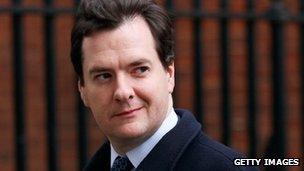Union fury over public sector pay plans
- Published
- comments

Mr Osborne is set to outline his Budget plans
Unions have reacted angrily to plans to scrap national pay rates for some public sector workers in the UK.
Chancellor George Osborne is expected to say civil servants, such as Jobcentre and DVLA staff, should have pay brought into line with private sector salaries in their regions.
The Public and Commercial Services union says it would cut regional wages.
The Treasury says public sector pay in some parts of England and Wales is up to 18% higher than the private sector.
Shadow chancellor Ed Balls said he feared the plans would end up in a "free-for-all" and would be difficult to keep public sector pay under control.
Mark Serwotka, general secretary of the Public and Commercial Services (PCS) union - which represents civil servants - told the BBC the plans would be "cruel, economically incompetent and counterproductive" at a time when public sector salaries and pensions were being cut.
The move would mean local factors, such as the cost of living and private sector pay rates, would now be taken into account for public sector workers.
Treasury research suggests the pay gap ranges from 18% in Wales to 0.5% in the south-east of England.
The plans would initially affect 160,000 civil servants working in Jobcentres, the Driver and Vehicle Licensing Agency (DVLA), and border guards at ports and airports.
But local pay rates affecting up to six million public sector workers could be rolled out from next year.
Treasury officials say it would ensure the UK has "a responsive, modern labour force".
Business Secretary Vince Cable would not confirm or deny the plans but said the idea of having more flexibility in the public sector was "surely right".
He told BBC Radio 4's Today programme: "What we're trying to do is make sure that throughout the public sector there's more genuine decision making at a local level and you have to take into account pay and conditions."
He added: "But it has got to be done very carefully because in the civil service, for example, you have to have career progression and that kind of national consideration has to be woven into the story as well."
A Treasury source told the BBC's Chris Mason the move was not about saving money but about ensuring the UK has "a responsive, modern labour force".
'Totally irresponsible'
The source told our correspondent the move is seen as "pro-growth" because it would help make the private sector become more competitive.
In response to the plans, Scottish Finance Secretary John Swinney said: "This would be totally irresponsible and place further pressures on household incomes at a time when we desperately need a boost in consumer confidence to get the economy moving again."
Meanwhile, Wales's First Minister Carwyn Jones said the government should be trying to improve regional disparities in pay, not making them worse.
"Surely we should be looking at a situation where we look to close the gap in income between different parts of the UK rather than make it worse, which is exactly what this will do."
And Northern Ireland's Finance Minister Sammy Wilson said he would oppose any attempts by Westminster to set local pay variations in the public sector.
The director of the Institute for Fiscal Studies, Paul Johnson, said the government faced a difficult task because public sector pay was frozen until 2014, and only then due to rise by 1%.
"If you want to introduce differential, it's much easier to do it at a time when pay's increasing more quickly so you can, for example, freeze pay in some regions and raise it more quickly in others," he said.
"If it's only going up 1% on average and you're freezing in some regions, you actually can't do very much unless you're waiting a very long time."
The NASUWT, the largest teachers' union, also criticised the suggestion.
General secretary Chris Keates said: "As usual the chancellor holds up the private sector as the comparator. The inconvenient truth he chooses to ignore is that large organisations in the private sector have national pay and conditions frameworks."
TUC general secretary Brendan Barber said: "Moving to regional pay will not just reduce the pay of millions of public servants, but hit regional economies outside London and the South East when people have less to spend."
Len McCluskey, Unite's general secretary, added: "All this will do is drive workers to the better paid regions, leaving large parts of the country without the professionals essential to sustain local services."
And Ravi Subramanian from Unison, Britain's biggest public sector union, said Mr Osborne effectively wanted nurses and care workers in the Midlands to take a pay cut to fund his 50p tax cut for millionaires in southern England.
"It's the politics of division and it shows that the Tories really are the nasty party," he said.
Mr Osborne initially set out the idea in the Autumn Statement.
At the time, he announced a review of national pay rates for public servants and asked the independent pay review bodies to report back in July.